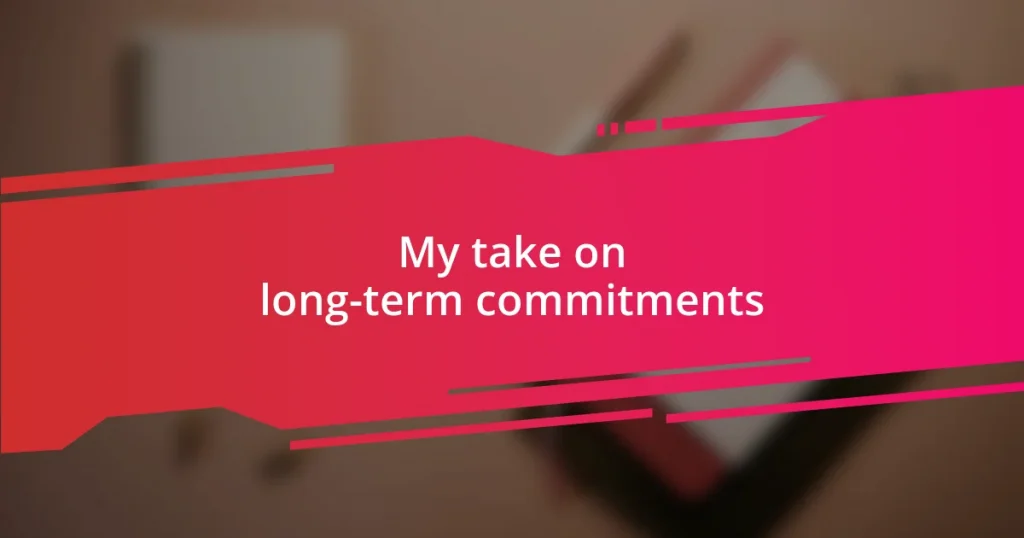Key takeaways:
- Long-term commitments require ongoing effort and adaptability, as they can evolve with our lives and priorities.
- Consistency is crucial for personal growth and success, fostering trust, discipline, and lasting results.
- Learning from commitment failures and embracing flexibility can lead to valuable insights and transformative personal growth.
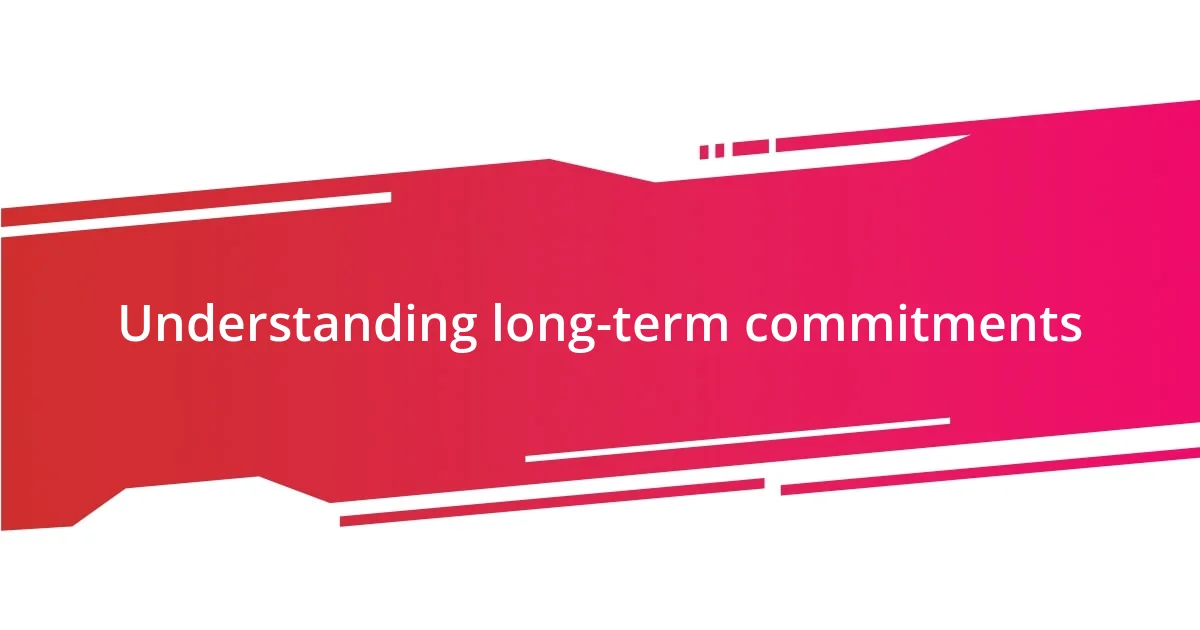
Understanding long-term commitments
Long-term commitments often feel like a leap into the unknown, and that can be both exciting and daunting. I remember when I decided to adopt a pet; it was a significant, long-term commitment, and there was a moment when I questioned whether I was ready for the responsibility. Have you ever felt that uncertainty?
These commitments, whether in relationships, careers, or personal goals, shape our lives in profound ways. I’ve held onto a friendship for over a decade now, and through all its ups and downs, I’ve learned that true commitment is about weathering the storms together. Isn’t it fascinating how these bonds can deepen as we navigate life’s challenges?
In understanding long-term commitments, it’s essential to recognize that they require ongoing effort and adaptability. There was a time when I thought my initial enthusiasm would carry me through, but I quickly realized that nurturing those commitments takes engagement and intention. Don’t you find it interesting how our perspectives shift the longer we commit to something?
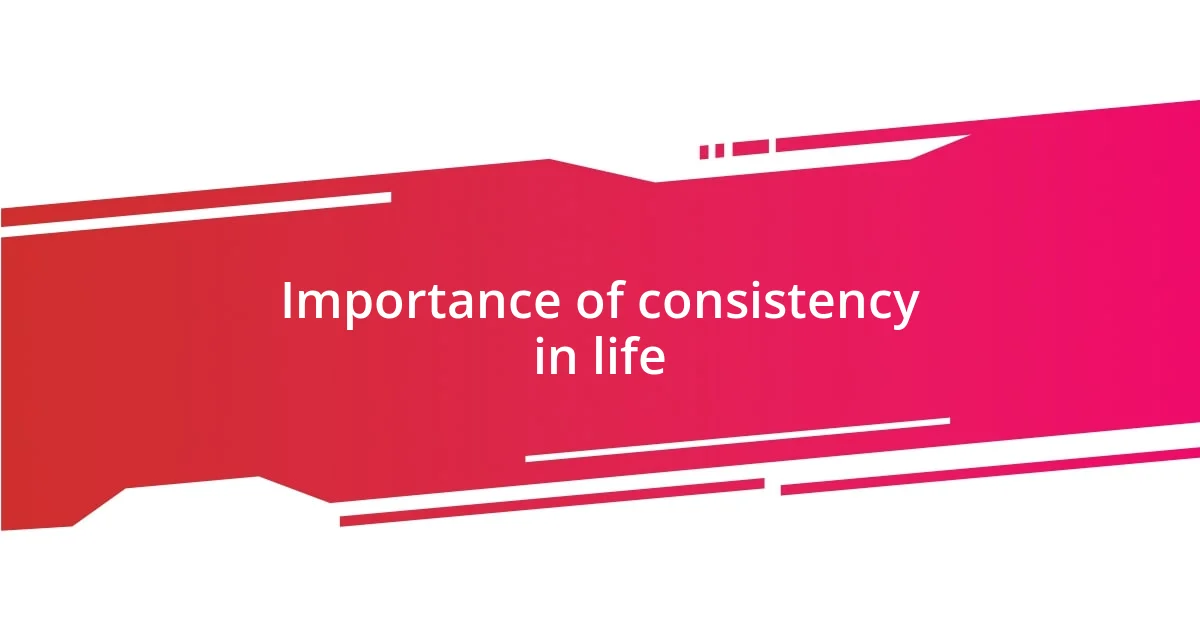
Importance of consistency in life
Consistency is the backbone of personal growth and success. I vividly remember a time in my life when I decided to commit to a daily exercise routine. At first, the results felt slow and minor, but as I stuck with it, I started noticing significant changes—not just physically but mentally too. That journey taught me the value of sticking to something, even when it feels tedious or challenging.
- It builds trust: People come to rely on your consistency in relationships and work.
- It fosters discipline: Regular practice enhances our ability to prioritize and manage our time efficiently.
- It creates a sense of stability: In a world full of uncertainties, consistency acts like an anchor, helping us navigate life’s storms.
- It leads to lasting results: Progress often accumulates over time, turning small, consistent actions into significant achievements.
Being consistent is a gift we give ourselves, allowing growth to happen in a more profound way. Each time I kept pushing through the days when motivation waned, I found not only strength but also a deeper appreciation for the journey. Consistency, in its essence, is about showing up for ourselves day after day, believing that each effort counts.
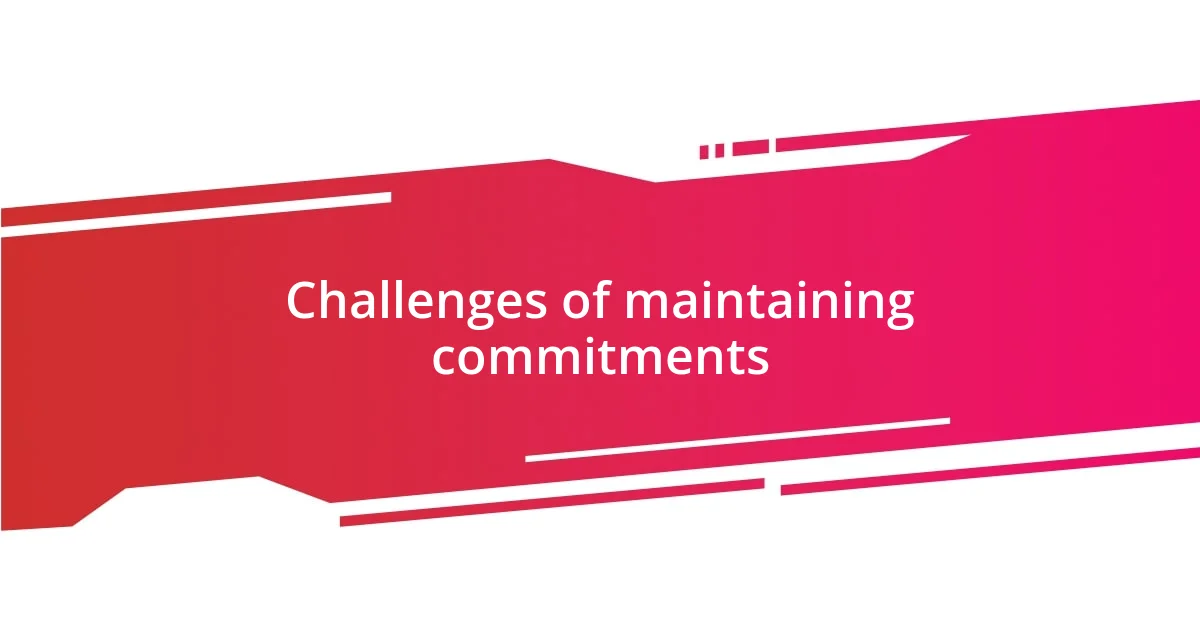
Challenges of maintaining commitments
Maintaining long-term commitments can often feel like navigating a rocky path. I recall a time when I pledged to volunteer regularly at a local shelter. Initially, I was fueled by excitement, but as the months progressed, balancing my schedule became increasingly challenging. Have you ever found yourself torn between obligations? It can be tough to prioritize.
Another significant challenge is the evolving nature of our lives. I used to think that once I committed to something, it would remain static, but life is anything but predictable. As my career shifted, I realized that my dedication to certain projects needed to adapt. It’s a balancing act, really—how do you adjust your commitments when circumstances change?
Lastly, there’s the emotional toll that comes with long-term commitments. Sometimes, the weight of expectations can feel overwhelming. I found that uncertainty can creep in, making me question whether I was still invested. Reconnecting with my original motivations became essential during those moments of doubt. Have you ever experienced that sense of disconnection? Finding clarity can be the key to reigniting your passion.
| Challenge | Impact |
|---|---|
| Balancing Priorities | Difficulty in managing time and obligations |
| Evolving Circumstances | Need for adaptation in commitments |
| Emotional Strain | Questions about investment and motivation |
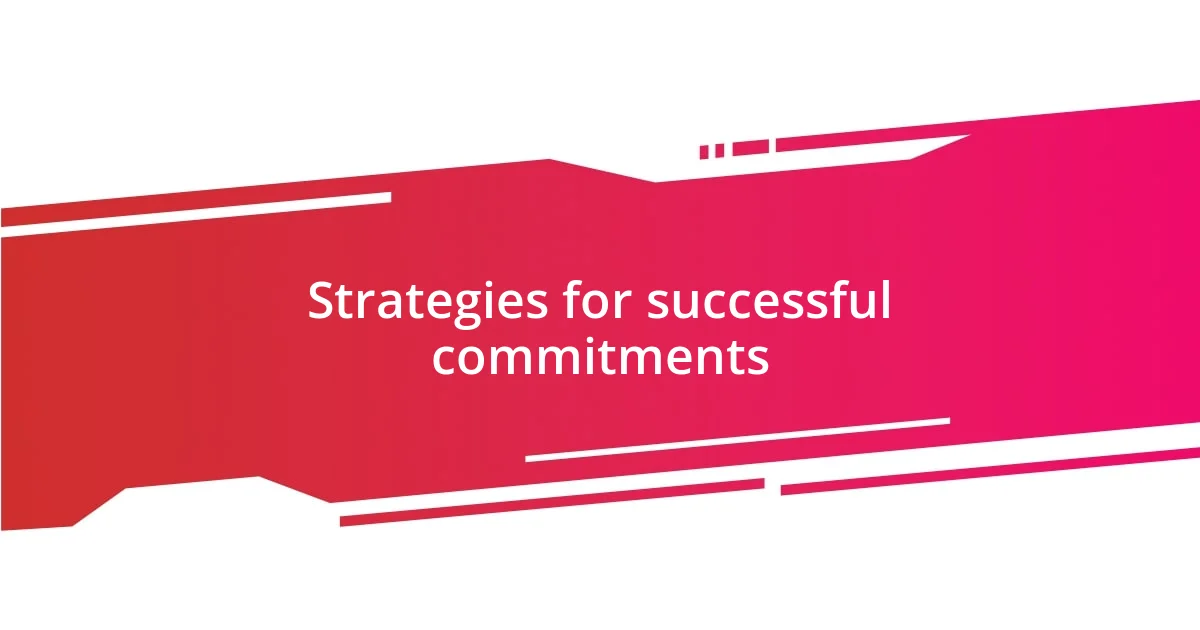
Strategies for successful commitments
Finding effective strategies for successful commitments can transform your experience. One method that has worked wonders for me is breaking down large goals into smaller, manageable steps. When I decided to write a book, the sheer scope of the task felt overwhelming. But by setting aside just 30 minutes each day to write, I slowly built momentum. Have you tried chunking your goals? It can make the journey feel less daunting and more achievable.
Another insightful strategy involves accountability. I remember partnering with a friend to commit to a regular fitness class. Sharing our progress and challenges not only kept me motivated but also created a supportive environment that made sticking to our commitment easier. How often do you discuss your goals with someone? Having that connection can ignite a shared sense of responsibility that drives both parties forward.
Finally, embracing flexibility is crucial in maintaining long-term commitments. There have been times when I had to adjust my training schedule due to unexpected events, but I learned that it’s okay to pivot when needed. Instead of viewing it as a failure, I began to see flexibility as an opportunity to adapt and grow. Do you allow yourself that kind of grace? Recognizing that life isn’t static can make the process of commitment more enjoyable and sustainable.
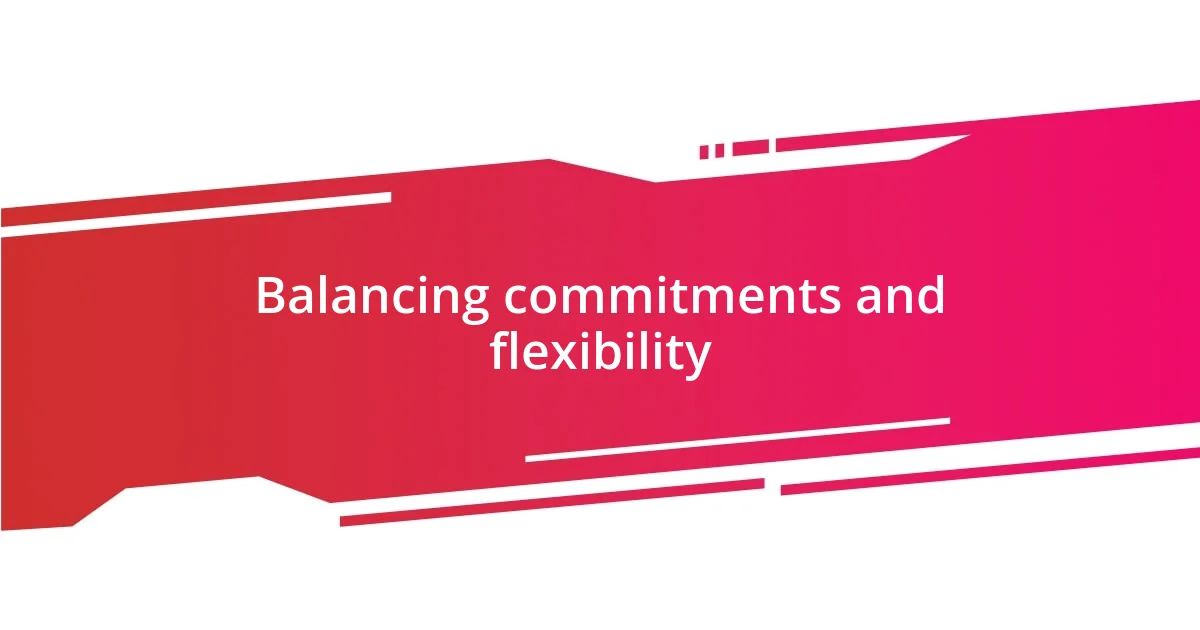
Balancing commitments and flexibility
Balancing commitments and flexibility can sometimes feel like walking a tightrope. I remember when I was knee-deep in a big work project that suddenly needed more of my focus. Instead of forcing myself to stick rigidly to my original schedule, I chose to shuffle my commitments around, allowing me to address the immediate demands without losing sight of my ongoing roles. Have you ever had to adjust your plans to fit life’s unpredictable nature? It’s those moments that can really teach us about the importance of flexibility.
In my experience, embracing this dance between commitment and adaptability often leads to unexpected opportunities. For instance, when I agreed to take on a long-term project, I was initially worried about how it might clash with my personal goals. However, as I remained open to adjusting my timeline and priorities, I found space for new interests like taking up a hobby or spending more quality time with family and friends. Isn’t it interesting how nurturing flexibility can enrich our lives in ways we never anticipated?
Moreover, there’s an emotional aspect to this balancing act that we shouldn’t overlook. I’ve felt the tension that arises when my commitments start feeling constrictive. By allowing myself the freedom to redefine what my commitments look like—from weekly meetings to bi-weekly check-ins—I discovered how liberating it can be to seek balance. Have you felt that tension as well? It’s a reminder that we are not just in a race to fulfill obligations; we are crafting a life that includes joy and growth along the way.
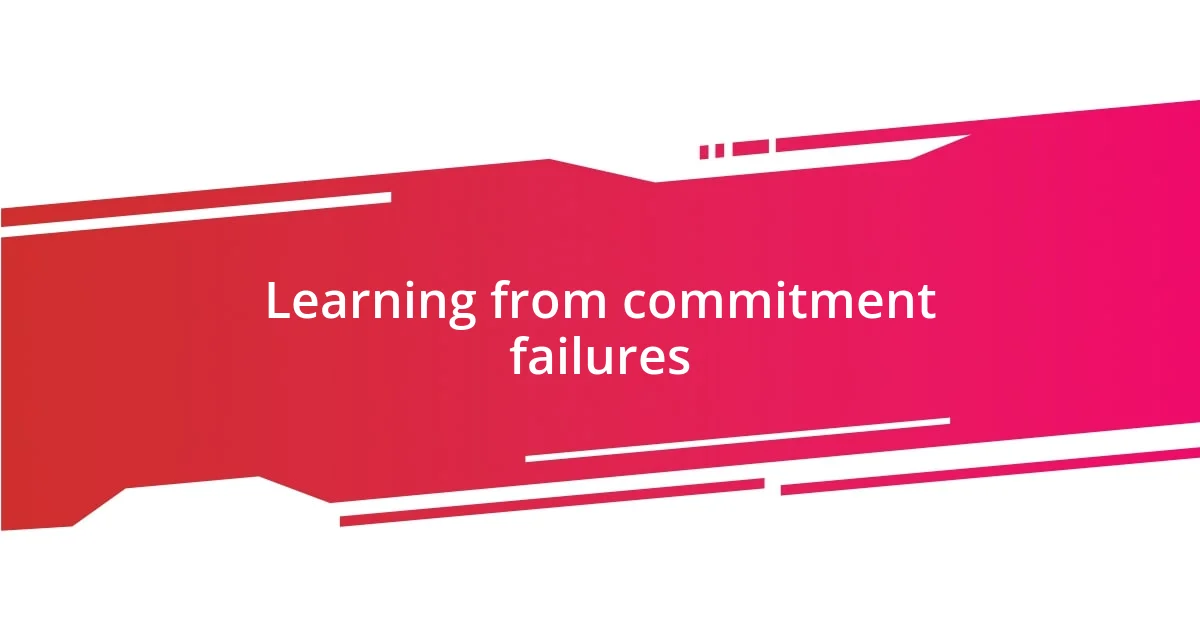
Learning from commitment failures
Learning from commitment failures can be a valuable teacher. I once poured my heart into a volunteer project that I quickly realized was far more time-consuming than I had anticipated. It felt like a slap in the face when I had to step back, but in that moment, I learned an essential lesson: sometimes, our enthusiasm can cloud our judgment about our limits. Have you ever found yourself in a similar situation where your eagerness led to an overwhelming commitment?
Reflecting on my past struggles has helped me identify patterns that I could avoid in future commitments. For example, I noticed that I often underestimate the time required for tasks, which creates unnecessary stress. When I committed to a leadership role in a community organization without fully assessing my schedule, I ended up feeling drained. Now, I make it a point to evaluate my energy levels and existing commitments before saying “yes.” Isn’t it interesting how one missed deadline can ripple into multiple areas of our lives?
One of the most profound realizations I’ve had through these experiences is the importance of self-compassion. I remember grappling with guilt after stepping back from a commitment that wasn’t working out, thinking I had failed. But as I learned to treat myself with kindness, I saw that every setback is part of growth. How often do we beat ourselves up over commitments that didn’t pan out? Understanding that these failures are not a reflection of our worth but rather stepping stones in our journey has been liberating.
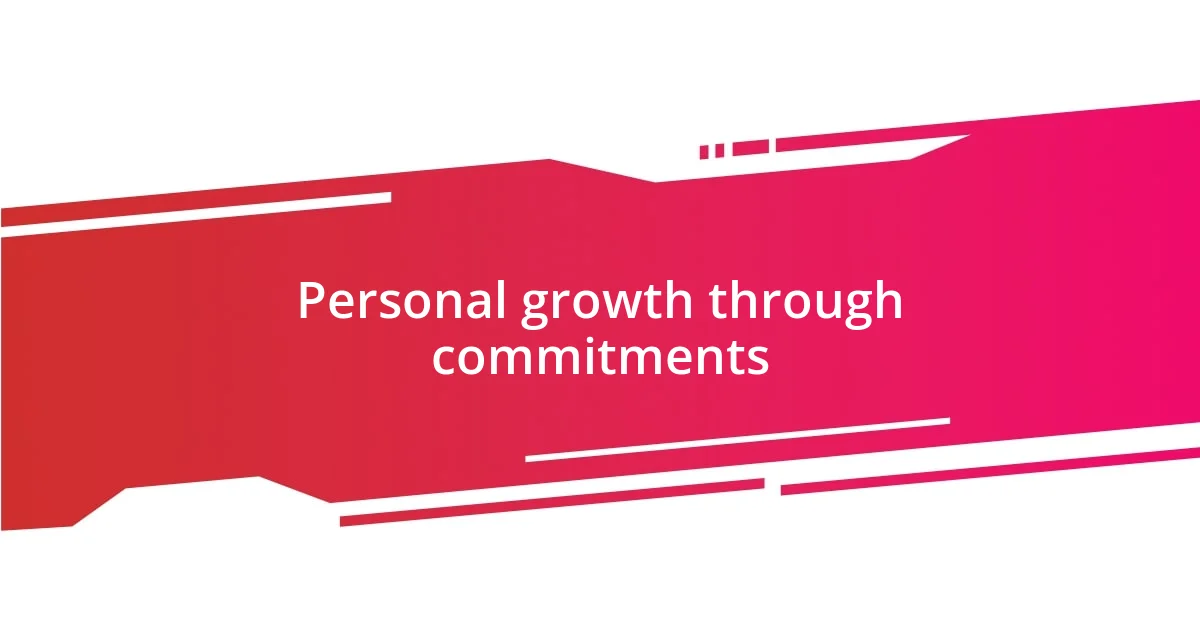
Personal growth through commitments
The journey of personal growth through long-term commitments can be quite transformative. I remember the first time I committed to a fitness program for an entire year. Initially, it felt daunting, and I questioned whether I would stick with it. But as I pushed through the initial discomfort, I began to not only see physical changes but also experience a shift in my mindset. How often do we underestimate the strength we gain from sticking to something challenging? It’s those moments of perseverance that reveal our capabilities.
Committing to something significant often forces us to confront aspects of ourselves we might prefer to avoid. I once signed up for a public speaking course, which terrified me at first. However, as I participated week after week, I discovered a newfound confidence in my voice. I realized that embracing discomfort can yield incredible growth. Have you ever faced your fears head-on, only to find they were less daunting than you imagined? That’s the beauty of committing—it’s about stretching our limits and redefining what’s possible.
Additionally, I’ve found that long-term commitments foster deeper relationships. Committing to a book club over several months, for example, led me to form connections with individuals I would have never crossed paths with otherwise. It taught me that growth isn’t just about personal achievements; it’s also about building a community. How enriching is it to share experiences with others who are on similar journeys? Those connections remind us that we’re not alone, and that cooperative growth is often just as significant as any individual accomplishment.










